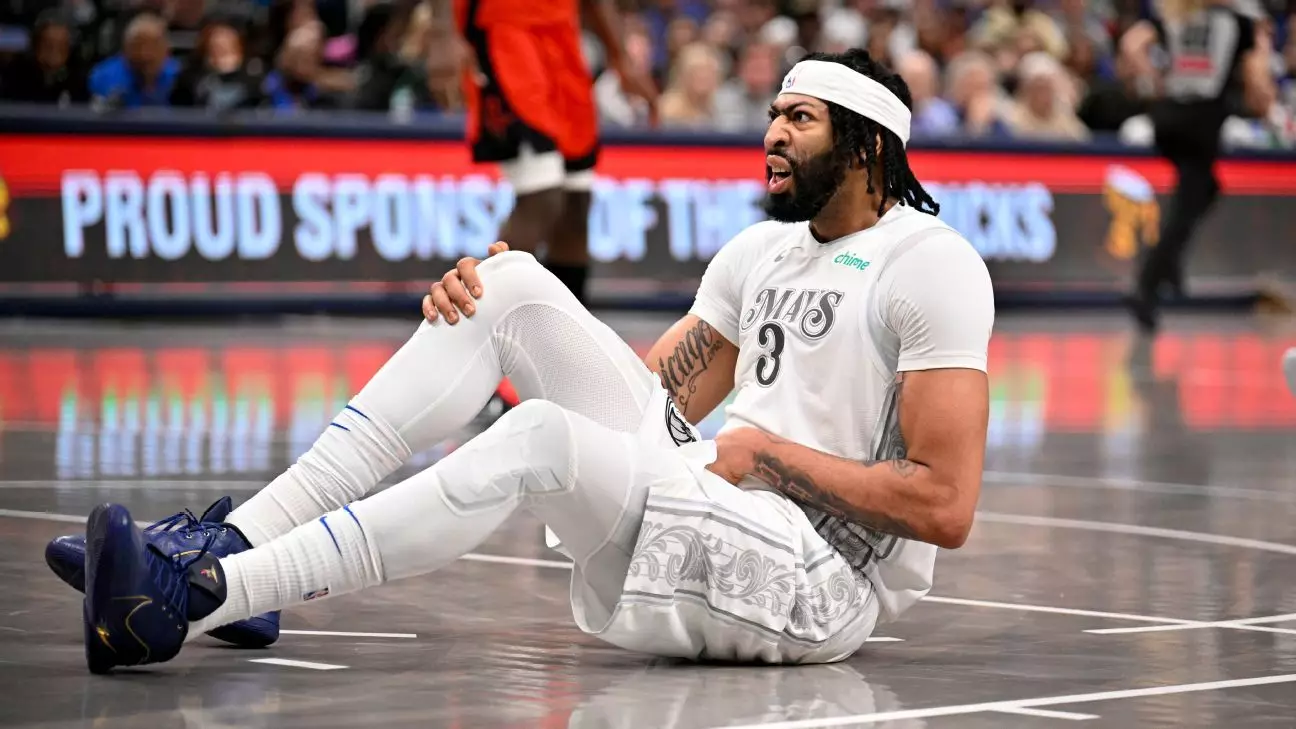The Dallas Mavericks welcomed Anthony Davis with high hopes, anticipating that his arrival could revitalize the franchise. However, as his debut season team member unfolded, fans were left with more questions than answers. The excitement surrounding the former Lakers superstar transformed into concern following his abrupt exit from the game against the Houston Rockets due to a lower-body injury. While the Mavericks managed to secure a 116-105 victory, the implications of Davis’ injury cast shadows over this initial success.
Davis was the centerpiece in a high-profile trade that sent franchise player Luka Doncic packing to Los Angeles. Such moves seldom go seamless; they often result in vehement reactions from fans and analysts alike, and the Mavericks’ recent decision did just that. The pregame protest—attended by roughly 1,000 passionate fans—was a clear indication of the discontent brewing in the hearts of the Mavericks faithful. Many supporters held up signs calling for team leadership to reconsider their loyalty to Doncic, echoing sentiments of betrayal and disappointment.
In his early minutes on the court, Davis demonstrated his All-Star caliber, showcasing impressive statistics with 26 points, 16 rebounds, and 7 assists in just 31 minutes of play. These numbers gave fans a glimpse of his potential impact, especially following an extended absence due to an abdominal injury he had sustained while still with the Lakers. However, his potential seemed clouded by anticipation of any long-term repercussions from yet another injury setback.
The adrenaline that filled the arena quickly dissipated as Davis succumbed to discomfort after an explosive start. Injuries have plagued Davis throughout his career, making his ability to maintain consistent playing time a subject of scrutiny. The challenge of performing at a high level while managing physical limitations is a narrative that has followed Davis for years. This latest injury—reported as tightness in the area between his groin and quadriceps—raises valid concerns about his future contributions in Dallas.
Following his exit, Davis expressed optimism, downplaying the severity of the injury and assuring fans that it wouldn’t keep him sidelined for long. “It’s nothing serious. I’m fine,” he stated, which may delight supporters momentarily. Yet, the history of his ailments casts doubt on whether that optimism will translate into reality. Whether Davis can navigate the demands of a full NBA season, especially after recent setbacks, remains to be seen.
General Manager Nico Harrison’s decision to trade Doncic has been a polarizing move within the organization and among the fanbase. The titular superstar led the Mavericks to the NBA Finals last season, setting sky-high expectations that his eventual absence now threatens to undermine. The trade sent shockwaves through the league, and it was no surprise that Harrison faced backlash, including threats that could be classified as alarming for any executive. His decision to avoid sitting in his usual spot during the game illustrates the pressure he is under as he steers the franchise in a new direction.
While Harrison’s expectations are undoubtedly high for Davis, it’s critical to weigh the concerns over the player’s durability heavily into any evaluation of the trade’s success. Although the immediate results may look positive, the long-term implications hinge on Davis’ health.
Ultimately, Anthony Davis’s debut with the Mavericks epitomized the complex reality of professional sports: a blend of exhilarating potential and pointed unpredictability. His performance, coupled with concerning injury updates, provokes a broader debate about the sustainability of such a high-stakes acquisition.
While the win against the Rockets was a welcome sight for Dallas fans, the prospect of navigating a season with uncertainty surrounding their newest star looms large. The Mavericks will need to build not just for the present, but for the future as they adjust to life without Doncic, relying on players like Davis to step up without faltering under the weight of expectations—something he has yet to prove consistently capable of achieving. Only time will tell if Davis can overcome the obstacles that have too often characterized his storied career.


Leave a Reply